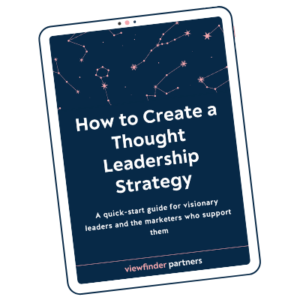“Focus on the hardest part of the problem.” That’s advice that my client, technical teamwork expert Chris Danek, gives to teams working on complicated medical device problems.
The advice applies to thought leadership, too, whether you’re talking about your work as a mechanical engineer or a management consultant. Hear me out.
Go beyond the basic questions and answers
A lot of the content on the Internet is basic information to solve common problems. Think about all of the questions you can ask Alexa and get a satisfactory answer:
- “How long do I cook a baked potato?”
- “How you spell vacuum?”
- “How many teaspoons are in a cup?”
In the work world, those basic questions could be:
- “What’s the best employee rewards software?”
- “About how many words are in a 20-minute speech?”
- “What’s the best day of the week to send an email newsletter?”
Those common questions have surface-level, often oversimplified, answers. And a lot of people are competing to get their answers heard or to appear on the first page of Google results.
That’s not the realm of thought leadership. Thought leadership is thinking about more challenging, more complex issues. It’s about focusing on the hardest part of the problem. There aren’t easy answers; instead, there are nuanced explorations. The question-askers need a guide, a sherpa, to help them make sense of all the information and varying opinions. They need an expert who can navigate all of that nuance with confidence.
Example: How to dig deeper to get to the hardest part of the problem
Recently, I was working with a team of experts on a white paper. Their outline looked like this:
- Define [big-picture trend] term
- Share context about why [big-picture trend] is popular right now
- Discuss core problem that teams struggle with when they work on [big-picture trend]
When I interviewed the team, it was clear that parts 1 and 2 were background information that is already covered widely in their industry. They’re Alexa-level questions and answers. Their readers surely know about this trend and how it has risen to ubiquity in their space.
What the readers need to know, and what isn’t already discussed on every blog and industry publication, is #3. The juicy part. The hardest part of the problem. The obstacles and challenges the experts have wrestled with, and the insights and aha moments that have surfaced through that hard work.
I advised the experts to scrap #1 and 2 and focus the entire paper on #3. Focus on the hardest problem. Once they reframed their perspective, everyone on the team had more energy and excitement about the topic. They wanted to put their heads together to think through those more nuanced questions and showcase their experience. It was no longer about skimming the surface but about going deep. The piece instantly transformed for the team working on it and their eventual readers.
The lesson: If you need inspiration for your thought leadership, go deeper. To develop more interesting thought leadership that gets your audience hooked on your deep expertise, stop answering surface-level questions. Dig deeper and focus on the hardest part of the problem.
Further reading
- Ready to dig deeper in your thought leadership? Ask yourself these questions.
- Try the prompt: “I wonder…”







